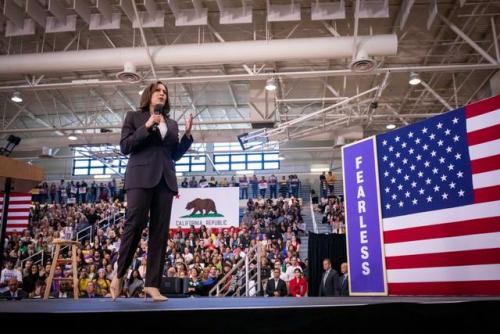Kamala Harris Stands on the Shoulders of Great Women
- Opinión

August 26th marks 100 years since Congress ratified the 19th amendment to the Constitution, guaranteeing women’s right to vote. The amendment states, “The right of citizens of the United States to vote shall not be denied or abridged by the United States or by any State on account of sex.” Unfortunately, the amendment was not implemented equally, and many states created laws and other impediments that continued to deny women the vote. African American women were subjected to the same Jim Crow laws that had already been used to deny African American men the vote.
The movement for women’s suffrage began early in the 19th century, and was closely connected to the movement for the abolition of slavery. Senator Kamala Harris’s selection as Joe Biden’s running mate, is a consequence, however late, of these early, intersectional struggles for freedom and equality. Harris is the first vice presidential nominee of a major party to be a woman of color, as well as the daughter of immigrants. Her father, Stanford economist Donald. J. Harris, is from Jamaica and her mother, cancer researcher Shyamala Gopalan, was of Tamil ancestry, from India. At her first campaign event with Biden, Harris acknowledged “all the heroic and ambitious women before me whose sacrifice, determination and resilience makes my presence here today even possible.”
A seminal moment in the women’s suffrage movement was the 1848 Seneca Falls Convention, in upstate New York. It produced a Declaration of Sentiments, that read, in part, “The history of mankind is a history of repeated injuries and usurpation on the part of man toward woman, having in direct object the establishment of an absolute tyranny over her… Having deprived her of this first right as a citizen, the elective franchise, thereby leaving her without representation in the halls of legislation, he has oppressed her on all sides.”
Renowned abolitionist Frederick Douglass, who had escaped slavery in his youth, was the only African American who attended, and was one of the men who signed the declaration. The controversial demand for women’s suffrage was hotly debated, and Douglass spoke in favor of its inclusion. He later reported in his abolitionist newspaper, The North Star, that the women-led gathering was an “extraordinary meeting…marked by ability and dignity.” He continued, “in respect to political rights, we hold woman to be justly entitled to all we claim for man. We go farther, and express our conviction that all political rights which it is expedient for man to exercise, it is equally so for woman.”
Not long after, in 1850, Sojourner Truth, another formerly enslaved person, remarked in her best known speech, “I think that ’twixt the negroes of the South and the women of the North, all talking about rights, the white men will be in a fix pretty soon.” Another who advocated for women’s suffrage was Harriet Tubman. She escaped from slavery then became a legendary conductor on the Underground Railroad, making dangerous trips back to Southern slave states to help others escape. During the Civil War, she was a spy for the Union Army, and became the only woman to lead troops, leading 150 African American troops on the Combahee River Raid, freeing 700 enslaved people and destroying several plantations.
Harriet Tubman was to be honored on the centennial of the 19th amendment, with the release of a new twenty dollar bill bearing her portrait, but Donald Trump and his Treasury Secretary Steven Mnuchin put a stop to that. Trump prefers the old version of the $20, with Andrew Jackson, a fiercely racist, slave-owning president best known for The Trail of Tears, forcing indigenous people to march from their ancestral homelands in the southeast U.S. to Oklahoma. Thousands died on the forced marches.
Crusading anti-lynching journalist Ida B. Wells, labor organizer Lucy Parsons, civil rights leader Fannie Lou Hamer, presidential candidate Shirley Chisolm, Congressmember Barbara Jordan and countless other African American women leaders forged the path that Kamala Harris now walks, often at great risk and without recognition or reward.
Trump is dead set to undermine the struggles and achievements of these women and the social movements they led. He and many in the Republican Party are desperately trying to suppress the vote of millions by crippling the U.S. Postal Service. Voting by mail is critical, particularly to communities of color that are being hardest hit by the COVID-19 pandemic. Trump has already unleashed racist and misogynistic attacks on Kamala Harris, and as the final three months of the 2020 campaign unfold, they will only get worse.
During one of Sojourner Truth’s speeches, as she was heckled by men, she fired back, “You may hiss as much as you please, but women will get their rights anyway. You can’t stop us, neither.”
The original content of this program is licensed under a Creative Commons Attribution-Noncommercial-No Derivative Works 3.0 United States License. Please attribute legal copies of this work to democracynow.org.
Del mismo autor
- Putin’s war on Ukraine could spark a nuclear catastrophe 04/03/2022
- La persecución de Biden contra Julian Assange 18/01/2022
- Biden’s persecution of Julian Assange 06/01/2022
- ¿Reconstruir mejor o construir más bombas? La elección es clara 13/12/2021
- Facebook Papers: cumplicidade no ódio, nas mentiras e na violência 28/10/2021
- Es hora de eliminar a Facebook de nuestra lista de amigos 11/10/2021
- El espía que se metió en tu teléfono 20/09/2021
- De Kabul al río Bravo, Estados Unidos crea crisis de refugiados 31/08/2021
- Después de décadas de guerra, el pueblo afgano merece la paz 23/08/2021
- Código rojo: la emergencia climática exige una acción inmediata 16/08/2021
Mujeres
- Paola Ricaurte 10/03/2022
- Giorgio Trucchi 03/03/2022
- Diana Carolina Alfonso, Mónica Miranda 22/02/2022
- Miguel Pinto Parabá 26/01/2022
- Jo-Marie Burt, Paulo Estrada 12/01/2022
Elecciones
- Zoe Alexandra 27/01/2022
- Aída García Naranjo Morales 22/12/2021
- Francisco Domínguez 21/12/2021
- Fernando de la Cuadra, Aglae Casanova 20/12/2021
- Francisco Domínguez 13/12/2021








